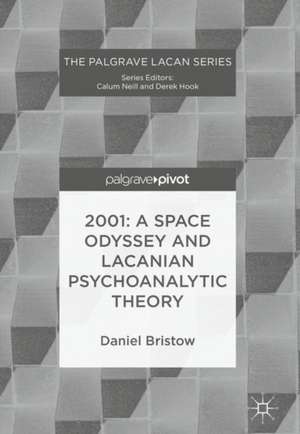2001: A Space Odyssey and Lacanian Psychoanalytic Theory: The Palgrave Lacan Series
Autor Daniel Bristowen Limba Engleză Hardback – 31 ian 2018
Din seria The Palgrave Lacan Series
-
 Preț: 282.07 lei
Preț: 282.07 lei - 20%
 Preț: 628.09 lei
Preț: 628.09 lei -
 Preț: 356.57 lei
Preț: 356.57 lei - 18%
 Preț: 943.88 lei
Preț: 943.88 lei - 18%
 Preț: 883.12 lei
Preț: 883.12 lei - 5%
 Preț: 1157.54 lei
Preț: 1157.54 lei - 18%
 Preț: 729.06 lei
Preț: 729.06 lei - 18%
 Preț: 778.63 lei
Preț: 778.63 lei - 18%
 Preț: 778.94 lei
Preț: 778.94 lei - 15%
 Preț: 697.97 lei
Preț: 697.97 lei -
 Preț: 317.30 lei
Preț: 317.30 lei - 18%
 Preț: 779.08 lei
Preț: 779.08 lei - 18%
 Preț: 885.49 lei
Preț: 885.49 lei - 15%
 Preț: 587.39 lei
Preț: 587.39 lei - 15%
 Preț: 639.73 lei
Preț: 639.73 lei - 18%
 Preț: 781.62 lei
Preț: 781.62 lei - 18%
 Preț: 783.68 lei
Preț: 783.68 lei - 18%
 Preț: 730.02 lei
Preț: 730.02 lei - 15%
 Preț: 635.80 lei
Preț: 635.80 lei - 15%
 Preț: 580.49 lei
Preț: 580.49 lei - 5%
 Preț: 774.24 lei
Preț: 774.24 lei - 18%
 Preț: 726.85 lei
Preț: 726.85 lei - 5%
 Preț: 1034.83 lei
Preț: 1034.83 lei -
 Preț: 482.35 lei
Preț: 482.35 lei - 15%
 Preț: 579.52 lei
Preț: 579.52 lei - 18%
 Preț: 726.23 lei
Preț: 726.23 lei - 15%
 Preț: 693.39 lei
Preț: 693.39 lei - 15%
 Preț: 587.39 lei
Preț: 587.39 lei - 18%
 Preț: 785.74 lei
Preț: 785.74 lei - 18%
 Preț: 893.53 lei
Preț: 893.53 lei - 15%
 Preț: 586.55 lei
Preț: 586.55 lei -
 Preț: 448.76 lei
Preț: 448.76 lei
Preț: 450.71 lei
Nou
Puncte Express: 676
Preț estimativ în valută:
86.27€ • 89.72$ • 72.29£
86.27€ • 89.72$ • 72.29£
Carte tipărită la comandă
Livrare economică 14-28 martie
Preluare comenzi: 021 569.72.76
Specificații
ISBN-13: 9783319694436
ISBN-10: 331969443X
Pagini: 138
Ilustrații: X, 132 p. 25 illus., 4 illus. in color.
Dimensiuni: 148 x 210 mm
Greutate: 0.33 kg
Ediția:1st ed. 2017
Editura: Springer International Publishing
Colecția Palgrave Macmillan
Seria The Palgrave Lacan Series
Locul publicării:Cham, Switzerland
ISBN-10: 331969443X
Pagini: 138
Ilustrații: X, 132 p. 25 illus., 4 illus. in color.
Dimensiuni: 148 x 210 mm
Greutate: 0.33 kg
Ediția:1st ed. 2017
Editura: Springer International Publishing
Colecția Palgrave Macmillan
Seria The Palgrave Lacan Series
Locul publicării:Cham, Switzerland
Cuprins
1. Overture.- 2. Monolith.- 3. Cut.- 4. Space.- 5. Silence.- 6. Surreality.
Notă biografică
Daniel Bristow is author of Joyce and Lacan: Reading, Writing, and Psychoanalysis, and contributing editor and co-creator of the Everyday Analysis Collective.
Textul de pe ultima copertă
In 1968, Stanley Kubrick completed and released his magnum opus motion picture 2001: A Space Odyssey; a time that was also tremendously important in the formation of the psychoanalytic theory of Jacques Lacan. Bringing these figures together, Bristow offers a study that goes beyond, as the film did. He extends Lacan’s late topological insights, delves into conceptualisations of desire, in G. W. F. Hegel, Alexandre Kojève, and Lacan himself, and deals with the major themes of cuts (filmic and psychoanalytic); space; silence; surreality; and ‘das Ding’, in relation to the movie’s enigmatic monolith. This book is a tour de force of psychoanalytic theory and space odyssey that will appeal to academics and practitioners of psychoanalysis and film studies, as well as to any fan of Kubrick’s work.
Caracteristici
Applies Lacanian theory to film studies alongside a resurgence of such thought which was established in the 1970s Discusses a highly regarded film that was rereleased in 2014 Offers an in-depth analysis of a relationship mentioned frequently in Lacanian studies but not previously written about
